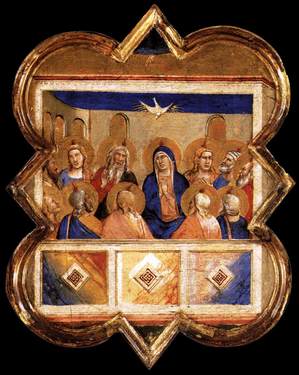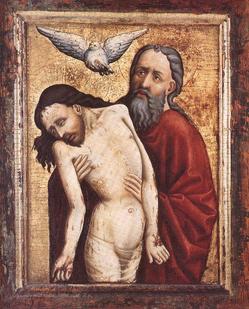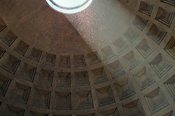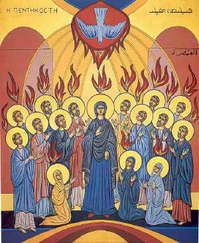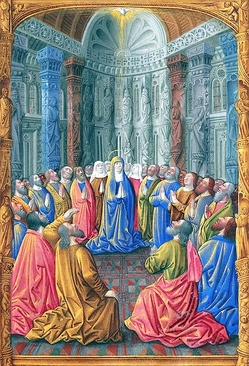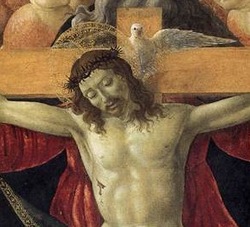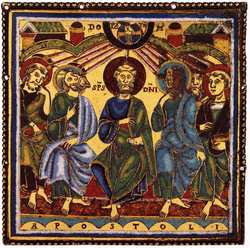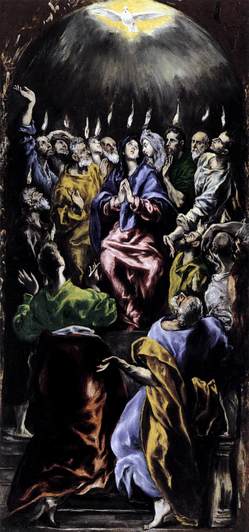Pope Benedict’s homily for the Solemnity of Pentecost is quite insightful and spiritually challenging. Would that we all could be open to the call of the Spirit in truth and in action. Come Holy Spirit, come through Mary!
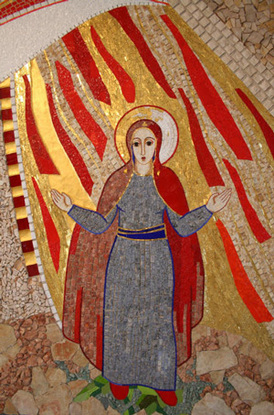 In the solemn celebration of Pentecost we are invited to profess our faith in the presence and in the action of the Holy Spirit and to invoke his outpouring upon us, upon the Church and upon the whole world. Let us make our own, and with special intensity, the Church’s invocation: “Veni, Sancte Spiritus!”
In the solemn celebration of Pentecost we are invited to profess our faith in the presence and in the action of the Holy Spirit and to invoke his outpouring upon us, upon the Church and upon the whole world. Let us make our own, and with special intensity, the Church’s invocation: “Veni, Sancte Spiritus!”
It is such a simple and immediate invocation, but also extraordinarily profound, which came first of all from the heart of Christ. The Spirit, in fact, is the gift that Jesus asked and continually asks of his Father for his friends; the first and principal gift that he obtained for us through his Resurrection and Ascension in to heaven.
Today’s Gospel passage, which has the Last Supper as its context, speaks to us of this prayer of Christ. The Lord Jesus said to his disciples: “If you love me, follow my commandments; and I will pray to the Father and he will give you another Paraclete who will remain with you forever” (John 14:15-16).
Here the praying heart of Jesus is revealed to us, his filial and fraternal heart. This prayer reaches its apex and its fulfillment on the cross, where Christ’s invocation is one with the total gift that he makes of himself, and thus his prayer becomes, so to speak, the very seal of his self-giving for love of the Father and humanity: Invocation and donation of the Spirit meet, they interpenetrate, they become one reality. “And I will pray to the Father and he will give you another Paraclete who will remain with you forever.” In reality, Jesus’ prayer — that of the Last Supper and the prayer on the cross — is a single prayer that continues even in heaven, where Christ sits at the right hand of the Father. Jesus, in fact, always lives his priesthood of intercession on behalf of the people of God and humanity and so prays for all of us, asking the Father for the gift of the Holy Spirit.
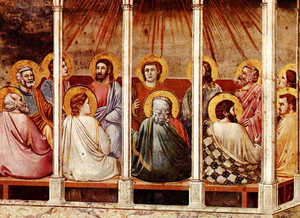 The account of Pentecost in the Acts of the Apostles — we listened to it in the first reading (Acts 2:1-11) — presents the “new course” of the work that God began with Christ’s resurrection, a work that involves man, history and the cosmos. The Son of God, dead and risen and returned to the Father, now breathes with untold energy the divine breath upon humanity, the Holy Spirit. And what does this new and powerful self-communication of God produce? Where there are divisions and estrangement he creates unity and understanding. The Spirit triggers a process of reunification of the divided and dispersed parts of the human family; persons, often reduced to individuals in competition or in conflict with each other, reached by the Spirit of Christ, open themselves to the experience of communion, can involve them to such an extent as to make of them a new organism, a new subject: the Church. This is the effect of God’s work: unity; thus unity is the sign of recognition, the “business card” of the Church in the course of her universal history. From the very beginning, from the day of Pentecost, she speaks all languages. The universal Church precedes the particular Churches, and the latter must always conform to the former according to a criterion of unity and universality. The Church never remains a prisoner within political, racial and cultural confines; she cannot be confused with states not with federations of states, because her unity is of a different type and aspires to transcend every human frontier.
The account of Pentecost in the Acts of the Apostles — we listened to it in the first reading (Acts 2:1-11) — presents the “new course” of the work that God began with Christ’s resurrection, a work that involves man, history and the cosmos. The Son of God, dead and risen and returned to the Father, now breathes with untold energy the divine breath upon humanity, the Holy Spirit. And what does this new and powerful self-communication of God produce? Where there are divisions and estrangement he creates unity and understanding. The Spirit triggers a process of reunification of the divided and dispersed parts of the human family; persons, often reduced to individuals in competition or in conflict with each other, reached by the Spirit of Christ, open themselves to the experience of communion, can involve them to such an extent as to make of them a new organism, a new subject: the Church. This is the effect of God’s work: unity; thus unity is the sign of recognition, the “business card” of the Church in the course of her universal history. From the very beginning, from the day of Pentecost, she speaks all languages. The universal Church precedes the particular Churches, and the latter must always conform to the former according to a criterion of unity and universality. The Church never remains a prisoner within political, racial and cultural confines; she cannot be confused with states not with federations of states, because her unity is of a different type and aspires to transcend every human frontier.
From this, dear brothers, there derives a practical criterion of discernment for Christian life: When a person or a community, limits itself to its own way of thinking and acting, it is a sign that it has distanced itself from the Holy Spirit. The path of Christians and of the particular Churches must always confront itself with the path of the one and catholic Church, and harmonize with it. This does not mean that the unity created by the Holy Spirit is a kind of homogenization. On the contrary, that is rather the model of Babel, that is, the imposition of a culture of unity that we could call “technological.” The Bible, in fact, tells us (cf. Genesis 11:1-9) that in Babel everyone spoke the same language. At Pentecost, however, the Apostles speak different languages in such a way that everyone understands the message in his own tongue. The unity of the Spirit is manifested in the plurality of understanding. The Church is one and multiple by her nature, destined as she is to live among all nations, all peoples, and in the most diverse social contexts. She responds to her vocation to be a sign and instrument of unity of the human race (cf. Lumen Gentium, 1) only if she remains free from every state and every particular culture. Always and in every place the Church must truly be catholic and universal, the house of all in which each one can find a place.
The account of the Acts of the Apostles offers us another very concrete indication. The universality of the Church is expressed by the list of peoples according to the ancient tradition: “We are Parthians, Medes, Elamites …,” etc. One may note that St. Luke goes beyond the number 12, which always expresses a universality. He looks beyond the horizons of Asia and northwest Africa, and adds three other elements: the “Romans,” that is, the western world; the “Jews and proselytes,” encompass in a new way the unity between Israel and the world; and finally “Cretans and Arabs,” who represent the West and the East, islands and land. This opening of horizons subsequently confirms the newness of Christ in the human space, in the history of the nations: The Holy Spirit involves men and peoples and, through them, it overcomes walls and barriers.
At Pentecost the Holy Spirit manifests himself as fire. His flame descended upon the assembled disciples, it was enkindled in them and gave them the new ardor of God. In this way what Jesus had previously said was realized: “I have come to cast fire upon the earth, and how I long that it already be burning!” (Luke 12:49). The Apostles, together with the faithful of different communities, carried this divine flame to the far corners of the earth; in this way they opened a path for humanity, a luminous path, and they worked with God, who wants to renew the face of the earth with his fire. How different this fire is from that of wars and bombs! How different is the fire of Christ, spread by the Church, compared with those lit by the dictators of every epoch, of last century too, who leave a scorched earth behind them. The fire of God, the fire of the Holy Spirit, is that of the bush that burned without being consumed (cf. Exodus 3:2). It is a flame that burns but does not destroy, that, in burning, brings forth the better and truer part of man, as in a fusion it makes his interior form emerge, his vocation to truth and to love.
A Father of the Church, Origen, in one of his homilies on Jeremiah, reports a saying attributed to Jesus, not contained in the sacred Scriptures but perhaps authentic, which he puts thus: “Whoever is near me, is near the fire” (Homilies on Jeremiah, L. I [III]). In Christ, in fact, there is the fullness of God, who in the Bible is compared to fire. We just observed that the flame of the Holy Spirit burns but does not destroy. And nevertheless it causes a transformation, and it must for this reason consume something in man, the waste that corrupts him and hinders his relations with God and neighbor.
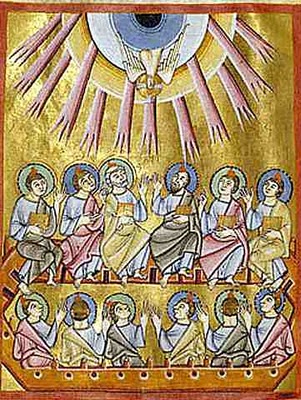 This effect of the divine fire, however, frightens us, we are afraid of being “burned,” we prefer to stay just as we are. This is because our life is often formed according to the logic of having, of possessing and not the logic of self-giving. Many people believe in God and admire the person of Jesus Christ, but when they are asked to lose something of themselves, then they retreat, they are afraid of the demands of faith. There is the fear of giving up something nice to which we are attached; the fear that following Christ deprives us of freedom, of certain experiences, of a part of ourselves. On one hand, we want to be with Jesus, follow him closely, and, on the other hand, we are afraid of the consequences that this brings with it.
This effect of the divine fire, however, frightens us, we are afraid of being “burned,” we prefer to stay just as we are. This is because our life is often formed according to the logic of having, of possessing and not the logic of self-giving. Many people believe in God and admire the person of Jesus Christ, but when they are asked to lose something of themselves, then they retreat, they are afraid of the demands of faith. There is the fear of giving up something nice to which we are attached; the fear that following Christ deprives us of freedom, of certain experiences, of a part of ourselves. On one hand, we want to be with Jesus, follow him closely, and, on the other hand, we are afraid of the consequences that this brings with it.
Dear brothers and sisters, we always need to hear the Lord Jesus tell us what he often repeated to his friends: “Be not afraid.” Like Simon Peter and the others we must allow his presence and his grace to transform our heart, which is always subject to human weakness. We must know how to recognize that losing something, indeed, losing ourselves for the true God, the God of love and of life, is in reality gaining ourselves, finding ourselves more fully. Whoever entrusts himself to Jesus already experiences in this life peace and joy of heart, which the world cannot give, and it cannot even take it away once God has given it to us.
So it is worthwhile to let ourselves be touched by the fire of the Holy Spirit! The suffering that it causes us is necessary for our transformation. It is the reality of the cross: It is not for nothing that in the language of Jesus “fire” is above all a representation of the cross, without which Christianity does not exist.
Thus enlightened and comforted by these words of life, let us lift up our invocation: Come, Holy Spirit! Enkindle in us the fire of your love! We know that this is a bold prayer, with which we ask to be touched by the flame of God; but we know above all that this flame — and only it — has the power to save us. We do not want, in defending our life, to lose the eternal life that God wants to give us. We need the fire of the Holy Spirit, because only Love redeems. Amen.
